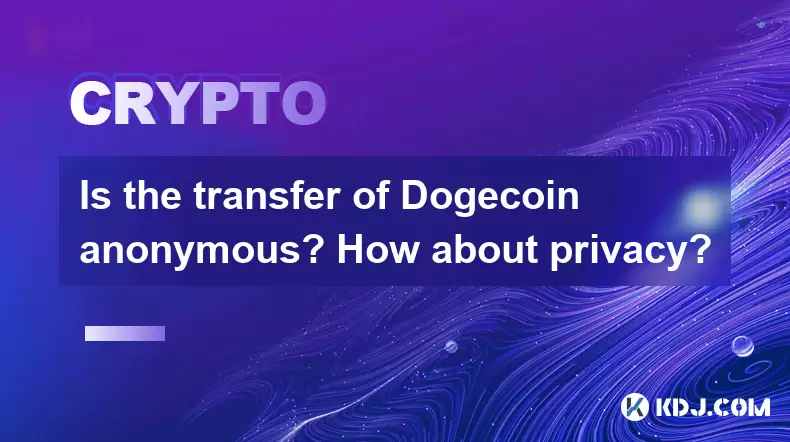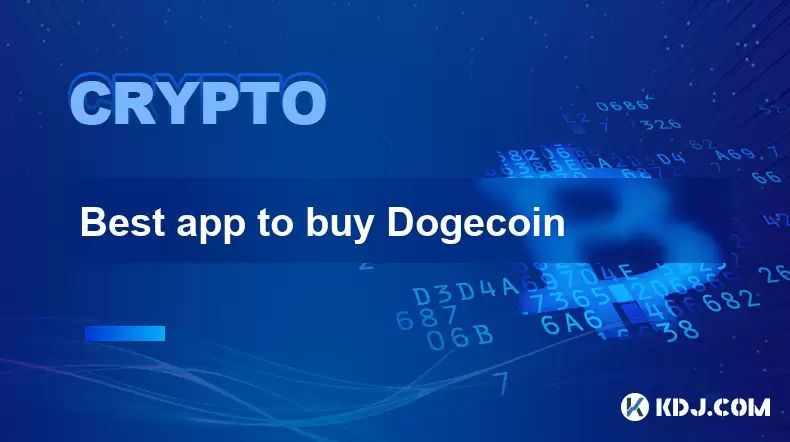-
 bitcoin
bitcoin $87959.907984 USD
1.34% -
 ethereum
ethereum $2920.497338 USD
3.04% -
 tether
tether $0.999775 USD
0.00% -
 xrp
xrp $2.237324 USD
8.12% -
 bnb
bnb $860.243768 USD
0.90% -
 solana
solana $138.089498 USD
5.43% -
 usd-coin
usd-coin $0.999807 USD
0.01% -
 tron
tron $0.272801 USD
-1.53% -
 dogecoin
dogecoin $0.150904 USD
2.96% -
 cardano
cardano $0.421635 USD
1.97% -
 hyperliquid
hyperliquid $32.152445 USD
2.23% -
 bitcoin-cash
bitcoin-cash $533.301069 USD
-1.94% -
 chainlink
chainlink $12.953417 USD
2.68% -
 unus-sed-leo
unus-sed-leo $9.535951 USD
0.73% -
 zcash
zcash $521.483386 USD
-2.87%
Is the transfer of Dogecoin anonymous? How about privacy?
Dogecoin transactions are pseudonymous, not anonymous, and the public blockchain can raise privacy concerns; users can enhance privacy using multiple addresses and mixing services.
May 10, 2025 at 09:50 am

The transfer of Dogecoin and its implications on privacy and anonymity are topics that frequently arise within the cryptocurrency community. As Dogecoin continues to gain popularity, understanding the extent to which transactions can be conducted anonymously and the level of privacy users can expect is crucial. This article delves into these aspects, providing detailed insights into Dogecoin's transaction anonymity and privacy features.
Understanding Dogecoin Transactions
Dogecoin, like other cryptocurrencies, operates on a blockchain, which is a public ledger of all transactions. Each transaction on the Dogecoin blockchain is recorded and can be viewed by anyone with access to the internet. This transparency is a fundamental feature of blockchain technology, designed to ensure the integrity and security of the network. However, it also raises questions about the anonymity and privacy of users.
Anonymity in Dogecoin Transactions
When discussing the anonymity of Dogecoin transactions, it's important to differentiate between pseudonymous and anonymous transactions. Dogecoin transactions are pseudonymous, meaning they are not directly linked to real-world identities. Instead, transactions are associated with public addresses, which are strings of alphanumeric characters. While these addresses do not reveal personal information, they can be traced back to the user if they are linked to their real-world identity through other means.
For instance, if a user sends Dogecoin from an exchange account to a personal wallet, and the exchange requires identity verification, the transaction can potentially be traced back to the user's real identity. Therefore, while Dogecoin transactions offer a degree of anonymity, they are not entirely anonymous.
Privacy Concerns with Dogecoin
Privacy is another critical aspect to consider when using Dogecoin. The public nature of the blockchain means that anyone can view the details of transactions, including the amount transferred and the addresses involved. This transparency can lead to privacy concerns, as it allows third parties to analyze transaction patterns and potentially infer sensitive information about users.
For example, if a user regularly sends Dogecoin to a particular address, observers might deduce that the user is making regular payments to a specific entity. This kind of pattern analysis can compromise user privacy, especially if the transactions are linked to real-world activities or identities.
Enhancing Anonymity and Privacy with Dogecoin
While Dogecoin itself does not offer built-in features for enhancing anonymity and privacy, users can take certain steps to improve their privacy. One common method is to use multiple addresses for different transactions. By not reusing addresses, users can make it more difficult for others to track their transaction history.
Another approach is to use mixing services or tumblers, which are third-party services that mix users' coins with others to obscure the trail of transactions. However, these services come with their own risks, including potential scams and the possibility of regulatory scrutiny.
Using Wallets and Exchanges for Enhanced Privacy
The choice of wallet and exchange can also impact the privacy of Dogecoin transactions. Some wallets offer features like coin control, which allows users to select specific coins for transactions, potentially enhancing privacy. Additionally, using decentralized exchanges or peer-to-peer trading platforms can reduce the risk of identity exposure compared to centralized exchanges that require KYC (Know Your Customer) verification.
When selecting a wallet or exchange, users should consider the following steps:
- Research the privacy features of different wallets and exchanges.
- Choose wallets that support multiple addresses and coin control.
- Opt for decentralized or peer-to-peer platforms if possible to minimize identity verification requirements.
Legal and Regulatory Considerations
It's also important to consider the legal and regulatory environment surrounding cryptocurrency transactions. In many jurisdictions, laws and regulations are evolving to address the use of cryptocurrencies, including measures to combat money laundering and terrorist financing. These regulations can impact the anonymity and privacy of Dogecoin transactions, as they may require exchanges and other service providers to collect and report user information.
Users should stay informed about the legal requirements in their jurisdiction and take steps to comply with them while also protecting their privacy. This might involve using reputable services that adhere to legal standards and provide clear privacy policies.
Frequently Asked Questions
Q: Can I use a VPN to enhance my privacy when using Dogecoin?A: Using a VPN can help mask your IP address, which can add an extra layer of privacy when accessing the internet. However, it does not directly affect the anonymity of Dogecoin transactions on the blockchain. It's important to use a reputable VPN service and understand its limitations in the context of cryptocurrency transactions.
Q: Are there any Dogecoin-specific tools for enhancing privacy?A: While Dogecoin itself does not have built-in privacy tools, users can leverage general cryptocurrency privacy tools like mixing services or tumblers. Additionally, some wallets designed for other cryptocurrencies, such as those with coin control features, can be used with Dogecoin to enhance privacy.
Q: How can I protect my Dogecoin wallet from being hacked?A: Protecting your Dogecoin wallet involves several steps, including using strong, unique passwords, enabling two-factor authentication (2FA), keeping your software up to date, and storing your private keys offline in a secure location. Regularly backing up your wallet and being cautious of phishing attempts are also crucial for maintaining security.
Q: Is it possible to completely anonymize Dogecoin transactions?A: Achieving complete anonymity with Dogecoin transactions is challenging due to the public nature of the blockchain. While methods like using multiple addresses and mixing services can enhance anonymity, they do not guarantee complete anonymity. Users must weigh the trade-offs between convenience, security, and privacy when using Dogecoin.
Disclaimer:info@kdj.com
The information provided is not trading advice. kdj.com does not assume any responsibility for any investments made based on the information provided in this article. Cryptocurrencies are highly volatile and it is highly recommended that you invest with caution after thorough research!
If you believe that the content used on this website infringes your copyright, please contact us immediately (info@kdj.com) and we will delete it promptly.
- White House Brokers Peace: Crypto, Banks, and the Future of Finance
- 2026-01-31 18:50:01
- Rare Royal Mint Coin Discovery Sparks Value Frenzy: What's Your Change Worth?
- 2026-01-31 18:55:01
- Pi Network's Mainnet Migration Accelerates, Unlocking Millions and Bolstering Pi Coin's Foundation
- 2026-01-31 18:55:01
- Lido's stVaults Revolutionize Ethereum Staking for Institutions
- 2026-01-31 19:25:01
- MegaETH's Bold Bet: No Listing Fees, No Exchange Airdrops, Just Pure Grit
- 2026-01-31 19:20:02
- BlockDAG Presale Delays Raise Questions on Listing Date Amidst Market Scrutiny
- 2026-01-31 19:15:01
Related knowledge

Bitcoincoin burning mechanism
Jul 20,2025 at 09:21pm
What is the Dogecoin burning mechanism?The Dogecoin burning mechanism refers to the process of permanently removing DOGE tokens from circulation by se...

How to earn free Bitcoincoin?
Jul 19,2025 at 10:08pm
What is Dogecoin and Why Earn It?Dogecoin (DOGE) started as a meme-based cryptocurrency in 2013 but has grown into a widely recognized digital asset. ...

Is Coinbase a good wallet for Bitcoincoin?
Jul 19,2025 at 04:42pm
Understanding Coinbase as a Wallet Option for DogecoinWhen considering where to store Dogecoin, Coinbase is often mentioned as a potential option due ...

How to buy Bitcoincoin with PayPal?
Jul 23,2025 at 06:57am
Understanding the Basics of Buying DogecoinBefore diving into the process of buying Dogecoin with PayPal, it’s essential to understand what Dogecoin i...

Best app to buy Dogecoin
Jul 23,2025 at 03:08pm
What Is a Cryptocurrency Exchange and How Does It Work?A cryptocurrency exchange is a digital marketplace where users can buy, sell, or trade cryptocu...

How are Dogecoin gains taxed?
Jul 25,2025 at 07:01am
Understanding the Taxation of Dogecoin GainsWhen it comes to Dogecoin (DOGE), many investors are drawn to its meme-inspired branding and volatile pric...

Bitcoincoin burning mechanism
Jul 20,2025 at 09:21pm
What is the Dogecoin burning mechanism?The Dogecoin burning mechanism refers to the process of permanently removing DOGE tokens from circulation by se...

How to earn free Bitcoincoin?
Jul 19,2025 at 10:08pm
What is Dogecoin and Why Earn It?Dogecoin (DOGE) started as a meme-based cryptocurrency in 2013 but has grown into a widely recognized digital asset. ...

Is Coinbase a good wallet for Bitcoincoin?
Jul 19,2025 at 04:42pm
Understanding Coinbase as a Wallet Option for DogecoinWhen considering where to store Dogecoin, Coinbase is often mentioned as a potential option due ...

How to buy Bitcoincoin with PayPal?
Jul 23,2025 at 06:57am
Understanding the Basics of Buying DogecoinBefore diving into the process of buying Dogecoin with PayPal, it’s essential to understand what Dogecoin i...

Best app to buy Dogecoin
Jul 23,2025 at 03:08pm
What Is a Cryptocurrency Exchange and How Does It Work?A cryptocurrency exchange is a digital marketplace where users can buy, sell, or trade cryptocu...

How are Dogecoin gains taxed?
Jul 25,2025 at 07:01am
Understanding the Taxation of Dogecoin GainsWhen it comes to Dogecoin (DOGE), many investors are drawn to its meme-inspired branding and volatile pric...
See all articles





















![Ultra Paracosm by IlIRuLaSIlI [3 coin] | Easy demon | Geometry dash Ultra Paracosm by IlIRuLaSIlI [3 coin] | Easy demon | Geometry dash](/uploads/2026/01/31/cryptocurrencies-news/videos/origin_697d592372464_image_500_375.webp)




















































